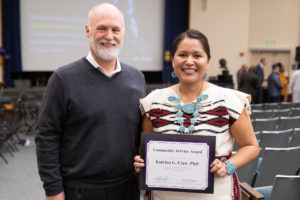 One of the University of Washington’s significant population health projects began ten years ago with a collaboration led by Pharmaceutics Professor Ken Thummel and Wylie Burke, professor of Bioethics and Humanities in the UW School of Medicine. The multidisciplinary research group with faculty from the Departments of Bioethics and Humanities, Epidemiology, Biostatistics, Genome Sciences, Medicinal Chemistry, Laboratory Medicine, and Pharmacy, joined a nationwide network of scientists through the National Institutes of Health (NIH) to study how genes affect individual response to medicines.
One of the University of Washington’s significant population health projects began ten years ago with a collaboration led by Pharmaceutics Professor Ken Thummel and Wylie Burke, professor of Bioethics and Humanities in the UW School of Medicine. The multidisciplinary research group with faculty from the Departments of Bioethics and Humanities, Epidemiology, Biostatistics, Genome Sciences, Medicinal Chemistry, Laboratory Medicine, and Pharmacy, joined a nationwide network of scientists through the National Institutes of Health (NIH) to study how genes affect individual response to medicines.
The mission of the National Institute of Health’s Pharmacogenomics Research Network (PGRN) is to catalyze and lead research in precision medicine for the discovery and translation of genomic variation influencing therapeutic and adverse drug effects. The NIH grant was one of 14 nationwide— totaling $166.3 million.
Ken and Wylie have used their NIH funding ($18 million over 10 years) to create a center to study pharmacogenomics in American Indian and Alaska Native (AI/AN) and rural Pacific Northwest populations. Their goal is to reduce barriers that limit the inclusion of American Indian and Alaska Native people in pharmacogenomic research, and to expand the knowledge base of pharmacogenomic variation, so that these traditionally underserved communities, and their healthcare providers, have increased opportunities to evaluate the merits of prospective pharmacogenetic testing and introduce advances into clinical practice.
Tribal communities have historically been overlooked in health-related research, or research was often conducted without their input or oversight, and with little data sharing afterward. “Given this history, a major component of our work is to restore trust between research communities and tribal communities,” said Ken. “We are doing this not only by working with tribal elders and members and their healthcare providers, and seeking their input on procedures, but also by being as transparent as possible.”
The center’s research initially focused on genetic variables influencing drug therapy with the blood thinner warfarin, the anti-estrogen tamoxifen, and the immunosuppressant tacrolimus. Through additional grant support from NIH, NWA-PGRN center post doc researcher and Navajo Tribe member Katrina Claw focused on nicotine metabolism to support smoking cessation and the metabolism of Vitamin D.
Vitamin D deficiency is a public health problem, particularly for northern latitude indigenous populations. Limited sunlight exposure and a shift to Western diets and lifestyles may be some of the driving causes of insufficiency, but gene variation modifies individual risk. As more Alaska Native and American Indian people suffer from vitamin D insufficiency, there may be increases in pathologies like cancer, heart disease, and bone disease.
In their latest round of NIH funding, NWA-PGRN investigators continue to partner with AI/AN communities in Alaska and Montana to conduct research on different pharmacogenes, including those that affect anticoagulation and antiplatelet therapies for the treatment of cardiovascular disease. They are also examining diet, as an additional modifier of anticoagulation and antiplatelet drug responses.
Katrina Claw, PhD | Post Doc & MLK Service Award Winner

Katrina’s research has focused on pharmacogenomics and the ethical implications of genomic research in Indigenous communities. Her projects focus on hepatic variation, tobacco pharmacogenomics, and perceptions of genetic research in American Indian communities. Working with tribal partners in the Northwest-Alaska Pharmacogenetic Research Network (NWA-PGRN), Katrina’s NIH fellowship research seeks to identify and functionally characterize variation in genes related to vitamin D metabolism. One of her projects is qualitative and has focused on examining the perspectives of American Indian tribes regarding genetic/genomic research. There is a history of research misconduct with Indigenous populations, and her work has examined attitudes and perspectives of tribal members with the eventual goals of developing community-driven genetic research projects and policies.